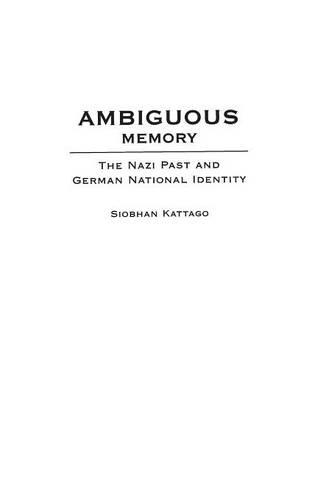
Ambiguous Memory: The Nazi Past and German National Identity
(Hardback)
Publishing Details
Ambiguous Memory: The Nazi Past and German National Identity
By (Author) Siobhan Kattago
Bloomsbury Publishing PLC
Praeger Publishers Inc
30th July 2001
United States
Classifications
Tertiary Education
Non Fiction
European history
The Holocaust
Second World War
305.831
Physical Properties
Hardback
208
Description
This title examines the role of memory in the building of a new national identity in re-unified Germany. The author maintains that the contentious debates surrounding contemporary monuments to the Nazi past testify to the ambiguity of German memory and the continued link of Nazism with contemporary German national identity. The work discusses how certain monuments, and the ways Germans have viewed them, contribute to the different ways Germans have dealt with the past, and how they continue to deal with it as one country. Siobhan Kattago concludes that West Germans have internalized their Nazi past as a normative orientation for the democratic culture of West Germany, while East Germans have universalized Nazism and the Holocaust, transforming it into an abstraction in which the Jewish question is down played. In order to form a new collective memory, the author argues that unified Germany must contend with these conflicting views of the past, incorporating certain aspects of both views. Providing a topography of East, West, and unified German memory during the 1980s and the 1990s, this work contributes to a better understanding of contemporary national identity and society. The author shows how public debate over such issues at Ronald Reagan's visit to Bitburg, the renarration of Buchenwald as Nazi and Soviet internment camp, the Goldhagen controversy, and the Holocaust memorial debate in Berlin contribute to the complexities surrounding the ways Germans see themselves, their relationship to the past, and their future identity as a nation. In a careful analysis, the author shows how the past was used and abused by both the East and the West in the 1980s, and how these approaches merged in the 1990s. This work takes a sociological approach to the role of memory in forging a new, integrative national identity.
Reviews
[T]his work should energize discussion at the graduate and faculty levels.-Choice
Ambiguous Memory is a very useful work of synthesis.-German Studies Review
Siobhan Kattago tackles a uniquely troubled, but potentially revealing, field of "collective mmeory": commemorations of the Holocaust in the postwar Germanys and the debates surrounding them during the 1980's and 1990's. Hers is the first up-to-date, English-language survey of the major projects in East and West Germany since 1980, as well as in the unified Federal Republic, so Germany-watchers will no doubt take note.-American Journal of Sociology
The lure to alter history can be irresistible, and Ambiguous Memory is an important reminder of the consequences to history and to politics when such alterations go unchecked. Ambiguous Memory serves as an important warning that if history is not to repeat itself, it must be remembered critically, without impunity.-APA
"This work should energize discussion at the graduate and faculty levels."-Choice
"[T]his work should energize discussion at the graduate and faculty levels."-Choice
"Ambiguous Memory is a very useful work of synthesis."-German Studies Review
"The lure to alter history can be irresistible, and Ambiguous Memory is an important reminder of the consequences to history and to politics when such alterations go unchecked. Ambiguous Memory serves as an important warning that if history is not to repeat itself, it must be remembered critically, without impunity."-APA
"Siobhan Kattago tackles a uniquely troubled, but potentially revealing, field of "collective mmeory": commemorations of the Holocaust in the postwar Germanys and the debates surrounding them during the 1980's and 1990's. Hers is the first up-to-date, English-language survey of the major projects in East and West Germany since 1980, as well as in the unified Federal Republic, so Germany-watchers will no doubt take note."-American Journal of Sociology
Author Bio
SIOBHAN KATTAGO is Adjunct Associate Professor at the Gallatin School of Individualized Study of New York University./e She has published articles on German collective memory and national identity.
